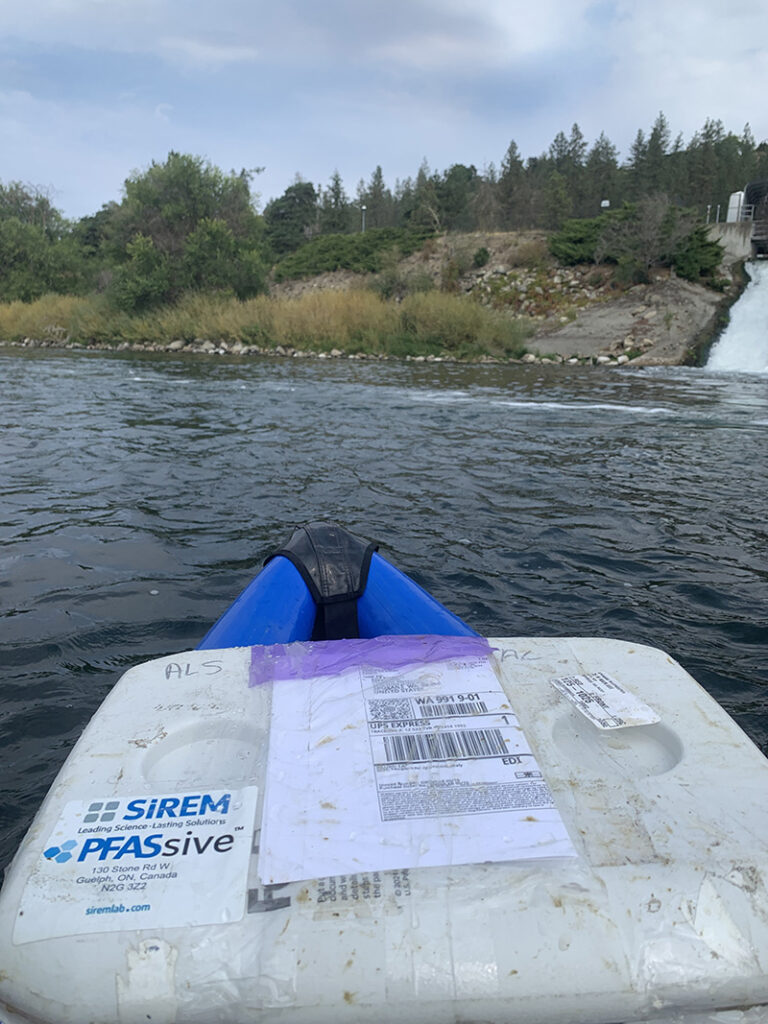By Lisa Laughlin
Cover photo courtesy of Spokane Riverkeepers
Last summer, the Spokane Riverkeeper tested the Spokane River for PFAS (per- and polyfluoroalkyl substances, also known as “forever chemicals”) as part of a national study with the Waterkeeper Alliance. They found significant hazardous levels of PFAS in the Spokane River and have pinpointed at least one likely source: land-applied biosolids.
Land-applied biosolids refer to treated sewage sludge that is spread on land as fertilizer. Innovative upcycling, perhaps, but it is being done without testing for PFAS compounds, which accumulate in our environment. Additionally, the effectiveness of PFAS filtration at our city’s water reclamation facility, which dumps treated sewer water into the Spokane River, has not been evaluated.
When the Spokane Riverkeeper collected water samples downstream of the Spokane Riverside Park Water Reclamation Facility, they found concentrations of four types of PFAS that exceeded the EPA’s level to safely ingest water, fish or shellfish.

PFAS are a group of synthetic chemicals that have been used in everyday products such as waterproof rain jackets, pesticides, ski wax and firefighting foam since the 1950s. Health impacts from PFAS have been linked to cancer, liver and kidney damage, hormone disruption and more. The national Waterkeeper Alliance writes that PFAS chemicals are present in at least 45% of tap water in the United States today.
Now that we know biosolids-linked PFAS are in our local waterways, the question becomes not how to get rid of these chemicals (they’re called “forever chemicals” for a reason), but how to stop contamination at the source. We’re looking to stem the bleeding, and the Spokane Riverkeeper is on triage.

With movement toward federal-level rollbacks on drinking water regulations, it will be up to local organizations like the Spokane Riverkeeper, the Washington State Department of Ecology, Spokane County and the City of Spokane to call for regular PFAS testing and regulation to prevent our waterways from further mass contamination.
The Spokane Riverkeeper will work with the Department of Health in coming months to create a consumption advisory for anglers, since eating contaminated fish is a significant way humans ingest PFAS chemicals. “Eating a single serving of contaminated freshwater fish can be the equivalent of drinking water contaminated with a high level of PFAS for a month (Barbo, et al, 2023).,” wrote Katelyn Scott, attorney and water protector of the Spokane Riverkeeper, on the organization’s online River Journal in June.
Scott is committed to creating testing regulations for the local PFAS problem, pointing out that it is a matter of social justice when PFAS-related health issues will affect low-income and tribal subsistence fishing communities most. “When fish are no longer safe to eat, these groups bear the disproportionate burden of both health risks and the loss of access to traditional and affordable food sources,” writes Scott.
Learn more about the issue and stay informed at Spokaneriverkeeper.com or Waterkeeper.org/pfas. You can also follow the Spokane Riverkeeper on social media.













